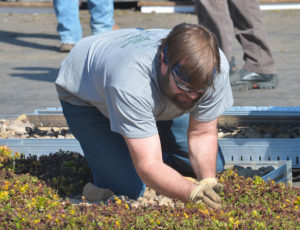Marshall University has received the 2016 Environmental Partnership Award from the West Virginia Department of Environmental Protection (WVDEP).

Under the leadership of Marshall’s environmental specialist, Travis Bailey, the university has made serious strides to improve the region’s water quality through its stormwater program, according to Matt Collier, environmental inspector for the WVDEP.
“Through Travis’ efforts, Marshall has installed green roofs throughout campus and continues to comply with the MS4 permit requirement of capturing the first one inch of rainfall from new development with the building of their new athletics complex and engineering building,” Collier said. “Marshall’s timely response and attention to detail helped to keep sediment out of the storm sewer system, which ultimately flows to Huntington Sanitary Board’s Combined Sewer System (CSO). This helps to prevent pollutants from reaching the Ohio River and any blockages within the aging CSO system.”
Bailey was hired over four years ago to implement the university’s Stormwater Management Program. He said the disposition of stormwater is limited to three ways: evaporation, absorption or going down the drain.
“If stormwater goes down the drain, then there is a good chance it will enter the Ohio River. Stormwater is known to carry pollutants (bacteria, nutrients, metals, etc.) into the receiving streams,” Bailey said. “These pollutants can impact aquatic life, recreational use, and probably most importantly our drinking water. Marshall’s team can’t clean up the river all by ourselves, we can only do our part, but we can show others what does and does not work based on our own trials of new technology.”
Bailey noted the university has been able to install two green roofs, which act as sponges to absorb water and allow plants to use the pollutants. He said the soil acts as a filter and will delay the discharge of the water, help insulate the building to lower energy use and increase the longevity of the roof.
“We have two rain gardens, rain barrels, a permeable paver pad – all of these are experimental projects being used to see how technology is going to hold up in our climate. Since the installation of these technologies is new to our area, most people are afraid to use them due to the unknown,” Bailey said. “We want to help educate and show people that they don’t have to be an engineer or have a lot of money to implement most of these practices in their homes. Stormwater is not a Marshall issue or a Huntington issue, but a community issue that could be greatly improved if we all join together.”
The Environmental Collaboration Committee who helped Bailey implement the project included representatives from the university’s College of Science, College of Liberal Arts, Housing and Residence Life, Career Services and the Physical Plant.
An award ceremony will take place Monday, May 16, at the WVDEP Headquarters in Charleston.